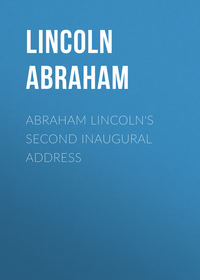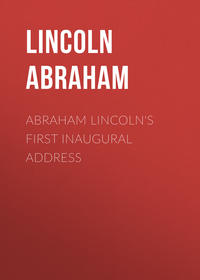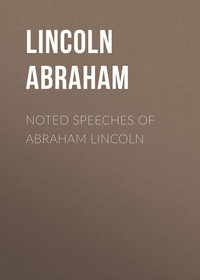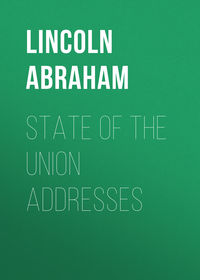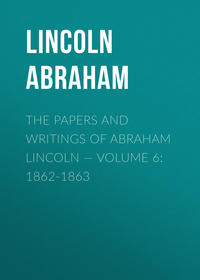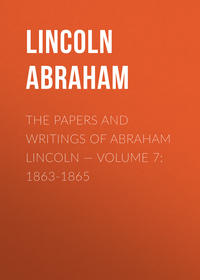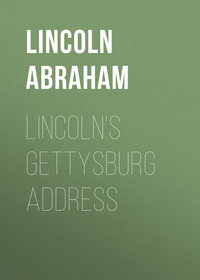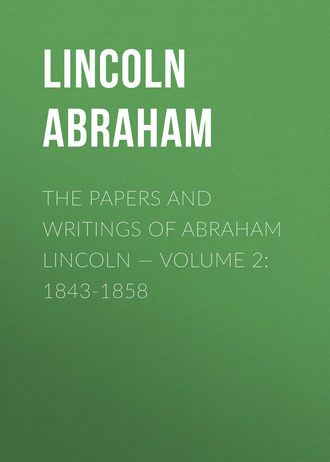 полная версия
полная версияThe Papers And Writings Of Abraham Lincoln — Volume 2: 1843-1858
But next the President tells us the Congress of the United States understood the State of Texas they admitted into the Union to extend beyond the Nueces. Well, I suppose they did. I certainly so understood it. But how far beyond? That Congress did not understand it to extend clear to the Rio Grande is quite certain, by the fact of their joint resolutions for admission expressly leaving all questions of boundary to future adjustment. And it may be added that Texas herself is proven to have had the same understanding of it that our Congress had, by the fact of the exact conformity of her new constitution to those resolutions.
I am now through the whole of the President's evidence; and it is a singular fact that if any one should declare the President sent the army into the midst of a settlement of Mexican people who had never submitted, by consent or by force, to the authority of Texas or of the United States, and that there and thereby the first blood of the war was shed, there is not one word in all the which would either admit or deny the declaration. This strange omission it does seem to me could not have occurred but by design. My way of living leads me to be about the courts of justice; and there I have sometimes seen a good lawyer, struggling for his client's neck in a desperate case, employing every artifice to work round, befog, and cover up with many words some point arising in the case which he dared not admit and yet could not deny. Party bias may help to make it appear so, but with all the allowance I can make for such bias, it still does appear to me that just such, and from just such necessity, is the President's struggle in this case.
Sometime after my colleague [Mr. Richardson] introduced the resolutions I have mentioned, I introduced a preamble, resolution, and interrogations, intended to draw the President out, if possible, on this hitherto untrodden ground. To show their relevancy, I propose to state my understanding of the true rule for ascertaining the boundary between Texas and Mexico. It is that wherever Texas was exercising jurisdiction was hers; and wherever Mexico was exercising jurisdiction was hers; and that whatever separated the actual exercise of jurisdiction of the one from that of the other was the true boundary between them. If, as is probably true, Texas was exercising jurisdiction along the western bank of the Nueces, and Mexico was exercising it along the eastern bank of the Rio Grande, then neither river was the boundary: but the uninhabited country between the two was. The extent of our territory in that region depended not on any treaty-fixed boundary (for no treaty had attempted it), but on revolution. Any people anywhere being inclined and having the power have the right to rise up and shake off the existing government, and form a new one that suits them better. This is a most valuable, a most sacred right — a right which we hope and believe is to liberate the world. Nor is this right confined to cases in which the whole people of an existing government may choose to exercise it. Any portion of such people that can may revolutionize and make their own of so much of the territory as they inhabit. More than this, a majority of any portion of such people may revolutionize, putting down a minority, intermingled with or near about them, who may oppose this movement. Such minority was precisely the case of the Tories of our own revolution. It is a quality of revolutions not to go by old lines or old laws, but to break up both, and make new ones.
As to the country now in question, we bought it of France in 1803, and sold it to Spain in 1819, according to the President's statements. After this, all Mexico, including Texas, revolutionized against Spain; and still later Texas revolutionized against Mexico. In my view, just so far as she carried her resolution by obtaining the actual, willing or unwilling, submission of the people, so far the country was hers, and no farther. Now, sir, for the purpose of obtaining the very best evidence as to whether Texas had actually carried her revolution to the place where the hostilities of the present war commenced, let the President answer the interrogatories I proposed, as before mentioned, or some other similar ones. Let him answer fully, fairly, and candidly. Let him answer with facts and not with arguments. Let him remember he sits where Washington sat, and so remembering, let him answer as Washington would answer. As a nation should not, and the Almighty will not, be evaded, so let him attempt no evasion — no equivocation. And if, so answering, he can show that the soil was ours where the first blood of the war was shed, — that it was not within an inhabited country, or, if within such, that the inhabitants had submitted themselves to the civil authority of Texas or of the United States, and that the same is true of the site of Fort Brown, then I am with him for his justification. In that case I shall be most happy to reverse the vote I gave the other day. I have a selfish motive for desiring that the President may do this — I expect to gain some votes, in connection with the war, which, without his so doing, will be of doubtful propriety in my own judgment, but which will be free from the doubt if he does so. But if he can not or will not do this, — if on any pretence or no pretence he shall refuse or omit it then I shall be fully convinced of what I more than suspect already that he is deeply conscious of being in the wrong; that he feels the blood of this war, like the blood of Abel, is crying to heaven against him; that originally having some strong motive — what, I will not stop now to give my opinion concerning to involve the two countries in a war, and trusting to escape scrutiny by fixing the public gaze upon the exceeding brightness of military glory, — that attractive rainbow that rises in showers of blood, that serpent's eye that charms to destroy, — he plunged into it, and was swept on and on till, disappointed in his calculation of the ease with which Mexico might be subdued, he now finds himself he knows not where. How like the half insane mumbling of a fever dream is the whole war part of his late message! At one time telling us that Mexico has nothing whatever that we can get — but territory; at another showing us how we can support the war by levying contributions on Mexico. At one time urging the national honor, the security of the future, the prevention of foreign interference, and even the good of Mexico herself as among the objects of the war; at another telling us that "to reject indemnity, by refusing to accept a cession of territory, would be to abandon all our just demands, and to wage the war, bearing all its expenses, without a purpose or definite object." So then this national honor, security of the future, and everything but territorial indemnity may be considered the no-purposes and indefinite objects of the war! But, having it now settled that territorial indemnity is the only object, we are urged to seize, by legislation here, all that he was content to take a few months ago, and the whole province of Lower California to boot, and to still carry on the war to take all we are fighting for, and still fight on. Again, the President is resolved under all circumstances to have full territorial indemnity for the expenses of the war; but he forgets to tell us how we are to get the excess after those expenses shall have surpassed the value of the whole of the Mexican territory. So again, he insists that the separate national existence of Mexico shall be maintained; but he does not tell us how this can be done, after we shall have taken all her territory. Lest the questions I have suggested be considered speculative merely, let me be indulged a moment in trying to show they are not. The war has gone on some twenty months; for the expenses of which, together with an inconsiderable old score, the President now claims about one half of the Mexican territory, and that by far the better half, so far as concerns our ability to make anything out of it. It is comparatively uninhabited; so that we could establish land-offices in it, and raise some money in that way. But the other half is already inhabited, as I understand it, tolerably densely for the nature of the country, and all its lands, or all that are valuable, already appropriated as private property. How then are we to make anything out of these lands with this encumbrance on them? or how remove the encumbrance? I suppose no one would say we should kill the people, or drive them out, or make slaves of them, or confiscate their property. How, then, can we make much out of this part of the territory? If the prosecution of the war has in expenses already equalled the better half of the country, how long its future prosecution will be in equalling the less valuable half is not a speculative, but a practical, question, pressing closely upon us. And yet it is a question which the President seems never to have thought of. As to the mode of terminating the war and securing peace, the President is equally wandering and indefinite. First, it is to be done by a more vigorous prosecution of the war in the vital parts of the enemy's country; and after apparently talking himself tired on this point, the President drops down into a half-despairing tone, and tells us that "with a people distracted and divided by contending factions, and a government subject to constant changes by successive revolutions, the continued success of our arms may fail to secure a satisfactory peace." Then he suggests the propriety of wheedling the Mexican people to desert the counsels of their own leaders, and, trusting in our protestations, to set up a government from which we can secure a satisfactory peace; telling us that "this may become the only mode of obtaining such a peace." But soon he falls into doubt of this too; and then drops back on to the already half-abandoned ground of "more vigorous prosecution." All this shows that the President is in nowise satisfied with his own positions. First he takes up one, and in attempting to argue us into it he argues himself out of it, then seizes another and goes through the same process, and then, confused at being able to think of nothing new, he snatches up the old one again, which he has some time before cast off. His mind, taxed beyond its power, is running hither and thither, like some tortured creature on a burning surface, finding no position on which it can settle down and be at ease.
Again, it is a singular omission in this message that it nowhere intimates when the President expects the war to terminate. At its beginning, General Scott was by this same President driven into disfavor if not disgrace, for intimating that peace could not be conquered in less than three or four months. But now, at the end of about twenty months, during which time our arms have given us the most splendid successes, every department and every part, land and water, officers and privates, regulars and volunteers, doing all that men could do, and hundreds of things which it had ever before been thought men could not do — after all this, this same President gives a long message, without showing us that as to the end he himself has even an imaginary conception. As I have before said, he knows not where he is. He is a bewildered, confounded, and miserably perplexed man. God grant he may be able to show there is not something about his conscience more painful than his mental perplexity.
The following is a copy of the so-called "treaty" referred to in the speech:
"Articles of Agreement entered into between his Excellency David G. Burnet, President of the Republic of Texas, of the one part, and his Excellency General Santa Anna, President-General-in-Chief of the Mexican army, of the other part:
"Article I. General Antonio Lopez de Santa Anna agrees that he will not take up arms, nor will he exercise his influence to cause them to be taken up, against the people of Texas during the present war of independence.
"Article II. All hostilities between the Mexican and Texan troops will cease immediately, both by land and water.
"Article III. The Mexican troops will evacuate the territory of Texas, passing to the other side of the Rio Grande Del Norte.
"Article IV. The Mexican army, in its retreat, shall not take the property of any person without his consent and just indemnification, using only such articles as may be necessary for its subsistence, in cases when the owner may not be present, and remitting to the commander of the army of Texas, or to the commissioners to be appointed for the adjustment of such matters, an account of the value of the property consumed, the place where taken, and the name of the owner, if it can be ascertained.
"Article V. That all private property, including cattle, horses, negro slaves, or indentured persons, of whatever denomination, that may have been captured by any portion of the Mexican army, or may have taken refuge in the said army, since the commencement of the late invasion, shall be restored to the commander of the Texan army, or to such other persons as may be appointed by the Government of Texas to receive them.
"Article VI. The troops of both armies will refrain from coming in contact with each other; and to this end the commander of the army of Texas will be careful not to approach within a shorter distance than five leagues.
"Article VII. The Mexican army shall not make any other delay on its march than that which is necessary to take up their hospitals, baggage, etc., and to cross the rivers; any delay not necessary to these purposes to be considered an infraction of this agreement.
"Article VIII. By an express, to be immediately despatched, this agreement shall be sent to General Vincente Filisola and to General T. J. Rusk, commander of the Texan army, in order that they may be apprised of its stipulations; and to this end they will exchange engagements to comply with the same.
"Article IX. That all Texan prisoners now in the possession of the Mexican army, or its authorities, be forthwith released, and furnished with free passports to return to their homes; in consideration of which a corresponding number of Mexican prisoners, rank and file, now in possession of the Government of Texas shall be immediately released; the remainder of the Mexican prisoners that continue in the possession of the Government of Texas to be treated with due humanity, — any extraordinary comforts that may be furnished them to be at the charge of the Government of Mexico.
"Article X. General Antonio Lopez de Santa Anna will be sent to Vera Cruz as soon as it shall be deemed proper.
"The contracting parties sign this instrument for the abovementioned purposes, in duplicate, at the port of Velasco, this fourteenth day of May, 1836.
"DAVID G. BURNET, President,
"JAS. COLLINGSWORTH, Secretary of State,
"ANTONIO LOPEZ DE SANTA ANNA,
"B. HARDIMAN, Secretary of the Treasury,
"P. W. GRAYSON, Attorney-General."
REPORT IN THE HOUSE OF REPRESENTATIVES, JANUARY 19, 1848
Mr. Lincoln, from the Committee on the Post-office and Post Roads, made the following report:
The Committee on the Post-office and Post Roads, to whom was referred the petition of Messrs. Saltmarsh and Fuller, report: That, as proved to their satisfaction, the mail routes from Milledgeville to Athens, and from Warrenton to Decatur, in the State of Georgia (numbered 2366 and 2380), were let to Reeside and Avery at $1300 per annum for the former and $1500 for the latter, for the term of four years, to commence on the first day of January, 1835; that, previous to the time for commencing the service, Reeside sold his interest therein to Avery; that on the 5th of May, 1835, Avery sold the whole to these petitioners, Saltmarsh and Fuller, to take effect from the beginning, January a 1835; that at this time, the Assistant Postmaster-General, being called on for that purpose, consented to the transfer of the contracts from Reeside and Avery to these petitioners, and promised to have proper entries of the transfer made on the books of the department, which, however, was neglected to be done; that the petitioners, supposing all was right, in good faith commenced the transportation of the mail on these routes, and after difficulty arose, still trusting that all would be made right, continued the service till December a 1837; that they performed the service to the entire satisfaction of the department, and have never been paid anything for it except $ — ; that the difficulty occurred as follows:
Mr. Barry was Postmaster-General at the times of making the contracts and the attempted transfer of them; Mr. Kendall succeeded Mr. Barry, and finding Reeside apparently in debt to the department, and these contracts still standing in the names of Reeside and Avery, refused to pay for the services under them, otherwise than by credits to Reeside; afterward, however, he divided the compensation, still crediting one half to Reeside, and directing the other to be paid to the order of Avery, who disclaimed all right to it. After discontinuing the service, these petitioners, supposing they might have legal redress against Avery, brought suit against him in New Orleans; in which suit they failed, on the ground that Avery had complied with his contract, having done so much toward the transfer as they had accepted and been satisfied with. Still later the department sued Reeside on his supposed indebtedness, and by a verdict of the jury it was determined that the department was indebted to him in a sum much beyond all the credits given him on the account above stated. Under these circumstances, the committee consider the petitioners clearly entitled to relief, and they report a bill accordingly; lest, however, there should be some mistake as to the amount which they have already received, we so frame it as that, by adjustment at the department, they may be paid so much as remains unpaid for services actually performed by them not charging them with the credits given to Reeside. The committee think it not improbable that the petitioners purchased the right of Avery to be paid for the service from the 1st of January, till their purchase on May 11, 1835; but, the evidence on this point being very vague, they forbear to report in favor of allowing it.
TO WILLIAM H. HERNDON — LEGAL WORK
WASHINGTON, January 19, 1848DEAR WILLIAM: — Inclosed you find a letter of Louis W. Chandler. What is wanted is that you shall ascertain whether the claim upon the note described has received any dividend in the Probate Court of Christian County, where the estate of Mr. Overbon Williams has been administered on. If nothing is paid on it, withdraw the note and send it to me, so that Chandler can see the indorser of it. At all events write me all about it, till I can somehow get it off my hands. I have already been bored more than enough about it; not the least of which annoyance is his cursed, unreadable, and ungodly handwriting.
I have made a speech, a copy of which I will send you by next mail.
Yours as ever,
A. LINCOLN.
REGARDING SPEECH ON MEXICAN WAR
TO WILLIAM H. HERNDONWASHINGTON, February 1, 1848.
DEAR WILLIAM: — Your letter of the 19th ultimo was received last night, and for which I am much obliged. The only thing in it that I wish to talk to you at once about is that because of my vote for Ashmun's amendment you fear that you and I disagree about the war. I regret this, not because of any fear we shall remain disagreed after you have read this letter, but because if you misunderstand I fear other good friends may also. That vote affirms that the war was unnecessarily and unconstitutionally commenced by the President; and I will stake my life that if you had been in my place you would have voted just as I did. Would you have voted what you felt and knew to be a lie? I know you would not. Would you have gone out of the House — skulked the vote? I expect not. If you had skulked one vote, you would have had to skulk many more before the end of the session. Richardson's resolutions, introduced before I made any move or gave any vote upon the subject, make the direct question of the justice of the war; so that no man can be silent if he would. You are compelled to speak; and your only alternative is to tell the truth or a lie. I cannot doubt which you would do.
This vote has nothing to do in determining my votes on the questions of supplies. I have always intended, and still intend, to vote supplies; perhaps not in the precise form recommended by the President, but in a better form for all purposes, except Locofoco party purposes. It is in this particular you seem mistaken. The Locos are untiring in their efforts to make the impression that all who vote supplies or take part in the war do of necessity approve the President's conduct in the beginning of it; but the Whigs have from the beginning made and kept the distinction between the two. In the very first act nearly all the Whigs voted against the preamble declaring that war existed by the act of Mexico; and yet nearly all of them voted for the supplies. As to the Whig men who have participated in the war, so far as they have spoken in my hearing they do not hesitate to denounce as unjust the President's conduct in the beginning of the war. They do not suppose that such denunciation is directed by undying hatred to him, as The Register would have it believed. There are two such Whigs on this floor (Colonel Haskell and Major James) The former fought as a colonel by the side of Colonel Baker at Cerro Gordo, and stands side by side with me in the vote that you seem dissatisfied with. The latter, the history of whose capture with Cassius Clay you well know, had not arrived here when that vote was given; but, as I understand, he stands ready to give just such a vote whenever an occasion shall present. Baker, too, who is now here, says the truth is undoubtedly that way; and whenever he shall speak out, he will say so. Colonel Doniphan, too, the favorite Whig of Missouri, and who overran all Northern Mexico, on his return home in a public speech at St. Louis condemned the administration in relation to the war. If I remember, G. T. M. Davis, who has been through almost the whole war, declares in favor of Mr. Clay; from which I infer that he adopts the sentiments of Mr. Clay, generally at least. On the other hand, I have heard of but one Whig who has been to the war attempting to justify the President's conduct. That one was Captain Bishop, editor of the Charleston Courier, and a very clever fellow. I do not mean this letter for the public, but for you. Before it reaches you, you will have seen and read my pamphlet speech, and perhaps been scared anew by it. After you get over your scare, read it over again, sentence by sentence, and tell me honestly what you think of it. I condensed all I could for fear of being cut off by the hour rule, and when I got through I had spoken but forty-five minutes.
Yours forever,
A. LINCOLN.
TO WILLIAM H. HERNDON
WASHINGTON, February 2, 1848DEAR WILLIAM: — I just take my pen to say that Mr. Stephens, of Georgia, a little, slim, pale-faced, consumptive man, with a voice like Logan's, has just concluded the very best speech of an hour's length I ever heard. My old withered dry eyes are full of tears yet.
If he writes it out anything like he delivered it, our people shall see a good many copies of it.
Yours truly,
A. LINCOLN.
ON THE MEXICAN WAR
TO WILLIAM H. HERNDONWASHINGTON, February 15, 1848.
DEAR WILLIAM: — Your letter of the 29th January was received last night. Being exclusively a constitutional argument, I wish to submit some reflections upon it in the same spirit of kindness that I know actuates you. Let me first state what I understand to be your position. It is that if it shall become necessary to repel invasion, the President may, without violation of the Constitution, cross the line and invade the territory of another country, and that whether such necessity exists in any given case the President is the sole judge.


